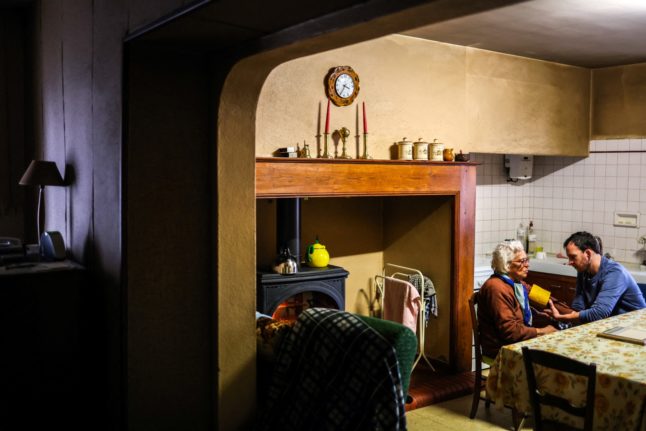In early April, France’s parliament voted in favour of the ‘ageing well’ (bien vieillir) law – measures meant for elderly people and those that care for them, including helping people to remain independent longer and offering more support for carers.
As of 2023, 21.3 percent of France’s population were over 65 years old and by 2030, over 65s are projected to outnumber those under 15.
France already has a robust system of help for older people – Explained: The help available for older people in France
But the new law is focused on helping people to ‘age better’, for example by staying in their own homes for longer or measures to avoid loneliness.
Community support
Loneliness – To combat social isolation, the law will allow social and health services to consult a town hall’s register of ‘vulnerable people’ (which exists for emergencies such as heat waves or health crises) to better reach out to them to offer help and support if required.
New government organisations – Thanks to the bien vieillir law, a new government body within each French département – the service public départemental de l’autonomie, or SPDA – will be created. These will serve as ‘one-stop shops’ for all information about supporting elderly and disabled people, as well as their caregivers.
The law also creates a ‘national autonomy conference’, similar to the national disability conference that takes place every three years. This will allow for more guidelines and debates surrounding policy to help people maintain their independence.
The Icope programme – Created by the WHO, this framework allows for the identification of physical and mental decline. The new law will make the ‘Icope programme’ accessible via an app.
This is meant to encourage more people to take the self-assessment to catch the first signs of a loss of autonomy. The law also plans for future steps that will involve inviting people aged 60-65 and 70-75 to autonomy loss ‘prevention appointments’.
Expanding local support teams – Currently, France has 24 ‘local teams’ (called EQLAAT) to help the elderly with daily tasks (referred to in French as aide technique) such as travel, meals, washing, and dressing. These teams are made up of occupational therapists and social workers. Starting in 2025 the EQLAAT teams will be generalised across the country.
READ MORE: How older people in France can get free assistance for outings
Legal framework
The law also includes several provisions to strengthen legal protections for older people, and to keep the issue higher on the political agenda.
Multi-annual programming law – Every five years, French lawmakers will be required to propose and vote on a law that would re-evaluate strategy, governance, funding and programming for the elderly.
Fighting against elder abuse – There are several measures meant to better protect people in care facilities from abuse. The first is that all care-home residents, as well as hospitalised people, will be asked to designate a ‘trusted person’. This could be a family member or the attending physician, and once the designation is made, their role will be clarified.
The law also creates a special government unit that will process complaints about mistreatment of the elderly and disabled. They will then centralise all reports that have been sent in using the national abuse ‘alert number’ (3977).
Judicial protection – When to comes to the French equivalent options to power of attorney and guardianship, the law will also try to streamline and better identify the roles of legal representatives. By the end of 2026, there will be a clear national register better outlining all of the protection measures for the guardianship and protection of vulnerable adults.
READ MORE: GUIDE: Guardianship or power of attorney options in France for elderly or vulnerable people
Care workers
A major problem is the shortage of care workers and home-helps (aide domiciles) since the job tends to be low-paid and under-valued.
Home-help workers – Home-help workers will be issued special ‘professional cards’ starting in 2025. This is aimed at better recognising those working in the sector and it will be distributed to those with two years’ experience working in the field. In practice, this will help those in the sector with daily life too – as they may be able to park their vehicles in limited traffic areas.
The law also provides for a larger budget within the ‘National Solidarity Fund of Autonomy’ which helps home-help workers with car and public transport expenses, as well as with obtaining driving licences.
There are also plans to revise payment structures. Within the law for 10 départements to experiment with replacing hourly rates for home-help workers with flat or ‘global’ rates. The test would start in 2025 and run until 2026.
Care homes
Although the main focus is on allowing people to remain in their own homes for as long as possible, there are also several sections to cover the country’s care home sector.
Daily visiting rights – One aspect of the law that has attracted a lot of attention from the French press is the creation of a ‘daily visiting right’ for those in care facilities and in nursing homes (Ehpads). During the Covid-19 pandemic, many elderly people in nursing homes went months without seeing their loved ones.
As a result, people in care facilities will be able to have any visitor they wish to see, without prior registration with the establishment. Care homes will only be able to ban visitors in exceptional circumstances – for example if a visit poses a threat to public order or to the safety of the residents or staff.
When it comes to people in palliative or hospice care, the daily visitation right is clarified as ‘absolute’ – meaning even in the event of a serious health crisis, it would still be respected.
Pets and animals – The law also creates the legal right to have a pet for residents of care homes.
Previously it was up to the individual home whether people would be allowed to bring their pets with them when they moved in, but the new law makes this a legal right – with the rule that the residents are able to meet their pet’s needs and comply with health and safety regulations.
Nursing or care homes will also be able to limit the number of pets per resident.
Family ties – Article 9 of the law will make it so that grandchildren will no longer be forced to help finance a grandparent’s accommodation in an Ehpad. Previously, all descendants, including grandchildren and great-grandchildren, were required to help fund living expenses (including care and clothing) for elderly family members in need, via the obligation alimentaire. Moving forward, older people in this situation will be able to access social assistance.
Similarly, children of parents convicted of a crime or sexual assault against the other parent or the children will also be exempt from the obligation alimentaire.
Regulating nursing homes – Ehpads will be subject to new quality assessments, which will be outlined by decree. There will also be new standards for the nutritional qualify of meals offered at care homes, with the goal of preventing and fighting against malnutrition.



 Please whitelist us to continue reading.
Please whitelist us to continue reading.
That photo by Charly Triballeau is truly an artistic masterpiece! Note the shadows, colors, perspective and tone of the piece. Very reminiscent of Edward Hopper’s “Nighthawks”.
Great photograph!